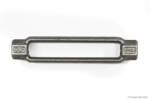Newest FAQs
Currently, the American Society of Mechanical Engineers (ASME) specification B 1.1 does not define a “standard” Unified National Coarse (UNC) thread pitch for 1-5/8” diameter bolts (or 1-7/8” for that matter). The “pseudo standard” coarse thread that is often used in the industry is 5-1/2 threads per inch. The 8UN (eight threads per inch) series... Read more
Let’s begin by addressing responsibility for filing a claim. When Portland Bolt ships product collect on a carrier of our customer’s choosing, ownership of the material changes hands the moment the carrier leaves our loading dock. Therefore, if a shipment is damaged or lost, it is our customer’s responsibility to file a claim against the... Read more
Many grades of bolt gain their strength though a heat treating process, and the addition of heat during welding can adversely alter those strength properties. However, some lower strength grades are easily weldable when manufactured from weldable steel. In general, steel items which have been heat treated for strength should generally not be welded since... Read more

Most likely no. Our “black” bolts are unfinished or bare steel. The term “black bolt” is an industry term for plain finish or no finish bolts. These bolts offer no corrosion resistance and will rust over time. If you are looking for a decorative coating that is actually black, you will want to specify that... Read more

Stainless steel type 316 and type 304 are raw material grades for stainless steel. Stainless steel fasteners are sometimes referred to and ordered as their raw material grades (such as SS 316 and SS304) and sometimes referred to and ordered as their ASTM specification. The common ASTM specifications that cover stainless steel bolts are A193,... Read more
Hot-dip galvanizing is a process of applying a protective zinc coating by dipping product in bath of molten zinc. Galvanizing is a favored method of protective coating due to its low cost, ease of application, and long maintenance-free service life. Generally applied at 830 to 870 degrees, the zinc will bond with the steel. It... Read more
S3 is the supplemental specification for a permanent grade identification stamp on the top end of F1554 anchor bolts. When this is called out, it replaces the color code requirement. Therefore, color coding is not required when supplemental requirement S3 is called out on the purchase order. For more information on marking and color coding... Read more
The slope of a beveled washer or a given segment represents how much the elevation changes over a certain distance. The higher the slope, the more steep the incline or decline. Slope is measured in degrees, ratios and grades. To find the slope in degrees, you need to make use of trigonometry ratios or more... Read more

You are correct that your capacity would be limited by the safe working load of the turnbuckle, but it would be limited to that regardless of the grade of steel used for the bracing rod. Let’s assume you are using mild steel, A307/A36 rods. The minimum yield strength of that material is 36,000 psi. Using... Read more

Commercially available ASTM F844 washers are typically not accompanied by certification documents, even though the F844 washers supplied by Portland Bolt are domestically manufactured. The reason mill test reports are not available for F844 washers is that there are no specific chemical or mechanical (strength, hardness) requirements for these washers. The only requirement is that they need... Read more
